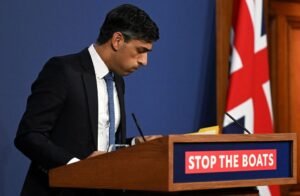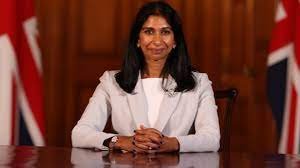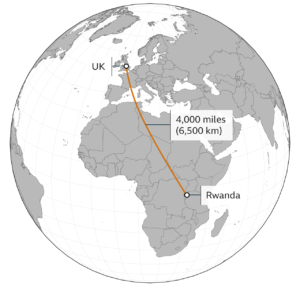On Wednesday, December 6, extremists in UK’s ruling Conservative party turned on Prime Minister Rishi Sunak, and the party’s immigration minister resigned over legislation concerning transferring migrants to Rwanda.
After Robert Jenrick announced his resignation, citing “strong disagreements with the direction” of the government’s immigration policy, the UK leader’s position became increasingly insecure.
The resignation came in response to a measure that the UK Supreme Court declared unlawful last month that sought to give the government the authority to ignore the European Convention on Human Rights and the UK Human Rights Act when deciding whether to deport asylum seekers to Rwanda.
Rwanda issued a warning, saying that should the UK disregard international law, it would withdraw from a convention accepting immigration.
On an especially difficult day for the UK PM, former conservative interior minister Suella Braverman also threatened to destroy Sunak in the next general election unless he became harsher on immigration.
The Resignation of the UK Minister
Robert Jenrick said in his letter of resignation to the Prime Minister that the proposed regulations were “a triumph of hope over experience.”
“The stakes for the country are too high for us not to pursue the stronger protections required to end the merry-go-round of legal challenges which risk paralyzing the scheme and negating its intended deterrent,” he stated. That was understood to be a reference to Sunak’s denial of Britain’s withdrawal from the European Convention on Human Rights.

In evaluating deportation cases, the bill suggests granting ministers the authority to ignore some provisions of the ECHR and the UK Human Rights Act.
Sunak said that Jenrick’s resignation was “disappointing” and that it was “based on a fundamental misunderstanding of the situation.”
UK’s Democratic Chaos
Suella Braverman, who was fired last month for an array of controversial remarks, had previously advised parliament that more needed to be done by the government to combat “mass, uncontrolled, illegal immigration.”
Blocking “all routes” of legal challenges to deportations in order to secure deportation aircraft to Rwanda by the time of the poll, which is anticipated for next year, was one of her requests.

She is believed to be positioning herself as a potential leader in case Sunak is compelled to resign following the national vote, as she has taken on the role of cheerleader for the vocal right-wing Tory wing. However, Braverman and other right-wing Tories want Sunak to completely withdraw from the ECHR.
In opinion polls conducted prior to the election that must take place by January 2025, the Tories are far behind the leading opposition Labor party. The UK government, according to Yvette Cooper, the spokesman for Labour on home affairs, is in “total chaos.”
“This is the desperate dying days of a party ripping itself apart, clearly totally out of ideas, lost any sense of leadership or direction,” she said in parliament.
Former attorney general Braverman has already attacked the UN convention on migrants and European human rights legislation for impeding the government’s aims and asked for more stringent measures. Her recent remarks have angered other firebrands who view complete authority over Britain’s borders as the last missing piece in the Brexit puzzle.
“The Conservative party faces electoral oblivion in a matter of months if it introduces yet another bill destined to fail,” she stated to lawmakers. She warned the Tories that they must “fight for sovereignty or let our party die,” adding menacingly, “I refuse to sit by and allow us to fail.” The situation is dire for the party.
UK’s Refugee Crisis
The UK government is imposing severe restrictions on immigration, which might negatively impact the economy of the nation, which is already hampered by a lack of manpower. Home Secretary James Cleverly said on Monday, December 4, that the minimum yearly income needed to settle in the UK will now be over £38,700, up from £26,200.
The cost of using the National Health Service (NHS), which is free for all Britons, will exceed £1,000 annually. Families will no longer be permitted to accompany non-British social workers. Employers in high-pressure industries (construction, education, etc.) will no longer be allowed to hire foreign workers at 20% less than the minimum wage.

The Conservative party is putting a lot of pressure on Prime Minister Rishi Sunak to cut back on legal immigration. Despite the establishment of a work visa system and the termination of European Union citizens’ freedom of movement following Brexit, it has achieved an all-time high. Cleverly informed the House of Commons, “We want to reduce annual arrivals by at least 300,000.”
If net migration from Europe has logically decreased after the Brexit vote (it is now negative, with 86,000 EU residents leaving between June 2022 and June 2023), then most of those leaving are replaced by Africa (Nigeria) and Asia (India, China, Pakistan).
The Office for National Statistics (ONS) released updated data on November 23. The data indicates that net migration to the UK, or the difference between arrivals and departures, was 745,000 in 2022.
Though one of the primary justifications for breaking away from the European Union (EU) was to “regain control” of the nation’s borders, this figure was double that of 2016 during the Brexit referendum.
In another way, Conservative leader David Cameron is far from having fulfilled his 2010 pledge to lower migration to fewer than 100,000 new entrants annually upon taking office.












Comments 3